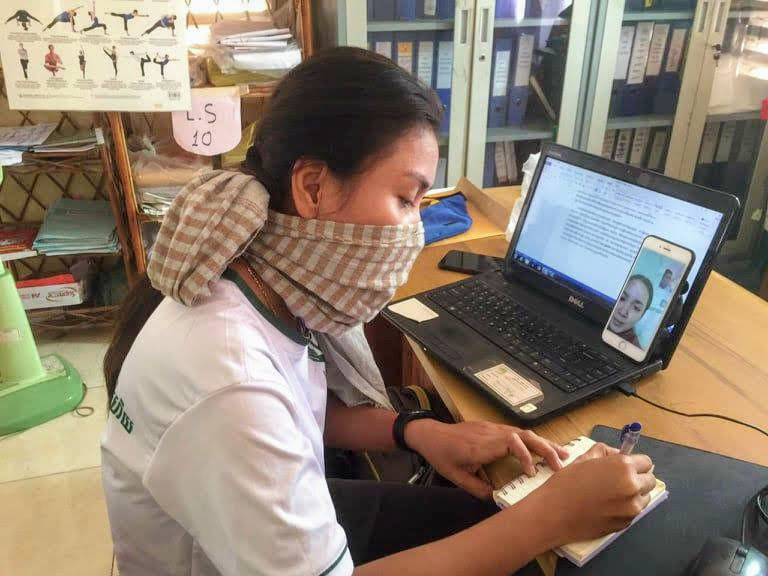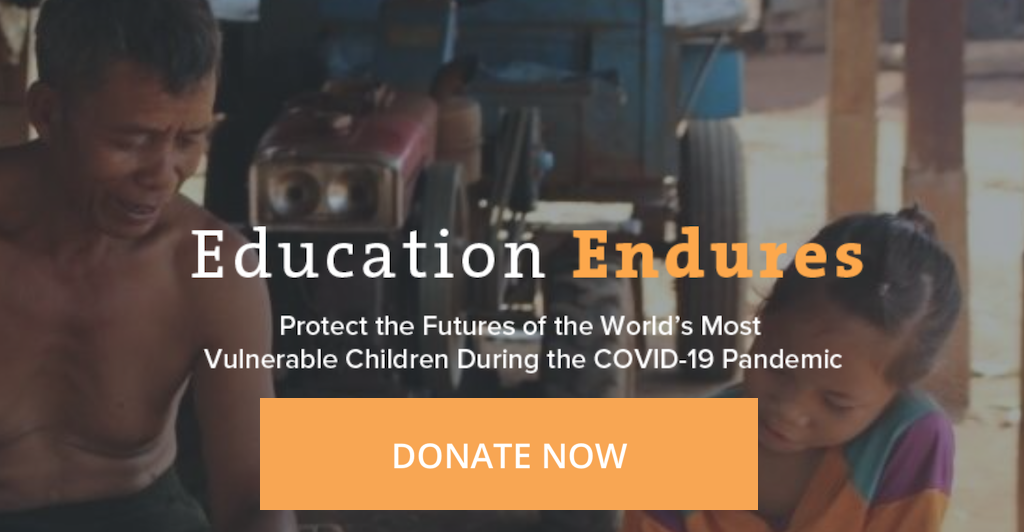ルーム・トゥ・リードCEO ギータ・ムラリ博士が、グローバル ウェブ マガジン『SHE-FILES』(2020.4.29)に寄稿した記事を紹介します。
(原文はこちらです:
https://she-files.com/covid-19-girls-face-risks-to-their-futures-but-women-mentors-bring-support/ )
新型コロナウィルス感染症:
少女たちは将来のリスクに直面するが、女性メンターが救世主となる
SHE-FILES 2020年4月29日
新型コロナウィルス感染症拡大が私たちの生活を変え続ける中、驚くべき真実が明らかになりました。低所得コミュニティの女性と少女は、特に社会的立場が弱く、多大な影響を受けています。
女性は多くの場合、コミュニティの世話をしながら最前線に立っています。世界保健機関(WHO)の分析によると、104カ国の医療・社会部門の労働力の70%を女性が占めています。また、特にジェンダーの固定観念が蔓延しているコミュニティでは、女性は病気の家族や隣人の世話をすることも期待されています。仕事に就いたとしても、女性の60%近くは、仕事の安全性がはるかに低いインフォーマル経済やギグエコノミーでの雇用にとどまっています。これらの仕事では、女性の収入は少なく、貯蓄も少なく、最終的には貧困に陥るリスクが高くなります。
私にとって最も心配なのは、教育への影響です。ルーム・トゥ・リードが女子教育プログラムを通じて支援している何万人もの少女や若い女性の将来について考えないわけにはいきません。学校閉鎖は、私たちの支援を受けている少女たちであっても苦労するでしょうから、そうでない場合はなおさらです。少女や若い女性が将来の可能性に支払うことになるであろう深刻なツケは広範囲に及び、取り返しのつかないことになります。
世界の多くの地域では、生徒たちが教室を離れることは、遠隔学習や友人とのしばしの別れを意味しますが、それ以外の多くの子どもたちにとっては、その影響は深刻です。世界中の低所得者層にとって、新型コロナウィルス感染症は、子どもの教育を永久に終わらせることを意味します。私たちは悲しいかな、その危険性をよく知っています。
私たちが活動している国々では、すでに少女たちの学校中退率の高さとの苦しい戦いに直面しています。だからこそ、私たちは現在、女子教育プログラムの提供を行っているすべての国で学校が閉鎖されていることを懸念しています。プログラムを通じて支援を行っている少女たちに会う最後の機会となり、多くの少女たちが学校に戻ることがないかもしれない、という厳しい現実に直面しています。
低所得者層コミュニティにいる少女たちは、若すぎる結婚や子どもを持つことへの大きなプレッシャーに直面しており、家庭内暴力や人身売買、レイプの被害者になる可能性があります。学校に支援的な環境がなければ、こうしたリスクは増大します。また、多くの人々は、この大流行の間、経済的に家族を支えるために、あるいは在宅ケアを通じて家族を支えるために、教育を放棄しなければならないという要求に直面することになるでしょう。これは少女にとって緊急かつ、非常に憂慮すべきことです。私たちは、人間の潜在的な可能性の中で確実に失われる可能性のある曲線を平坦にするための介入を実施しなければならない。

サパナはネパールの21歳の女性で、ルーム・トゥ・リードの女子教育プログラムを卒業し、看護師になるという夢を叶えました。彼女は今、この大流行の最中、勇敢に、そして無私の心で患者のケアをすることで、地域社会を助けています。サパナは、少女を教育することで何が起こるかを証明しています。
教育への投資がなければ、これらのコミュニティには、教育を受けた若い女性の第一世代、医療従事者の第一世代は存在しなかったでしょう。サパナの言葉を紹介します。
「私の両親は、パンデミックを恐れて看護師の仕事を辞めるように言い張っていました。両親と長い間話し合って、ようやくパニックから解放されました。私は自分の仕事が大好きで、だからこそ一生懸命勉強したのです。人の役に立てるように」。
私たちは、支援方法を知っています。このような暗い時代にあって、私たちの希望の源は、身近な存在である強い女性メンターの存在です。ルーム・トゥ・リードの支援を受けている少女たちは、定期的にメンターと面会し、メンターは、少女たちの擁護者であり、指導者でもあります。このようにサポートを受けながら、障害を克服し、自分の道を切り開いていきます。少女たちの住まいが距離的に離れているため、メンターは自宅を訪問して、少女たちの健康状態を直接、確認することはできなくなっています。しかし、少女たちと定期的に連絡を取り合う必要性がこれまで以上に緊急性を増しているため、メンターは重要な仕事を継続するための解決策を模索してきました。
私たちのチームは、最も危険にさらされている少女たちを特定できているので、より集中的に支援をすることができます。「ソーシャル・モビライザー」と呼ばれる私たちのメンターは、少女とその家族に電話をかけ、可能な限りビデオチャットや会議を行い、少女たちが安全に、そして粘り強く教育を続けることができるようにサポートを行っています。
カンボジアでは、カンポンチャム地方で活躍するソーシャルモビライザー・ラニーは、現在、ロックダウン下ではありますが、140名の少女たちを担当しています。私たちの活動の理由は、女の子に力を与え、男女平等を実現することです。子どもたちが教育を受けている限り、社会はより良いものになるでしょう。ラニーをはじめ、ルーム・トゥ・リードのチームは、WhatsAppやFacebookメッセンジャーまで、ソーシャルメディアのチャンネルを駆使して、女の子とコミュニケーションを取るための革新的な方法を実践しています。女の子が携帯電話を持っていない場合は、メンターが、親や親戚、近所の人にコンタクトをして、携帯電話が利用できるようにサポートも行っています。

ルーム・トゥ・リードCEO
ギータ・ムラーリ博士
◆この困難な時期にも子ども達が継続して教育を受けられるよう、ご支援をお願いいたします。
寄付はこちらから:
https://give.roomtoread.org/Together2020
COVID-19: GIRLS FACE RISKS TO THEIR FUTURES BUT WOMEN MENTORS BRING SUPPORT
SHE-FILES 29th April 2020
https://she-files.com/covid-19-girls-face-risks-to-their-futures-but-women-mentors-bring-support/
(She-files is a global web magazine written by and for women – with no glass ceiling. We provide a platform that advances and informs public discussion. )
SAN FRANCISCO — As the COVID-19 pandemic continues to alter our lives, a startling truth has been realized that, sadly, mirrors trends of all global crises. Women and girls, particularly those in vulnerable communities, are disproportionately impacted.
Women are often on the front lines, caring for their communities. Women comprise 70% of the healthcare and social sector workforce in 104 countries, analyzed by the World Health Organization (WHO). Women are also expected to care for sick family members and neighbors, particularly in communities where gender stereotypes prevail. Even when it comes to work, nearly 60% of women are in the informal or gig economy where jobs are far less secure. In these jobs, women earn less, save less, and ultimately, are at greater risk of falling into poverty.
For me, the impact on education is most worrisome. I can’t stop thinking about the futures of the tens and thousands of girls and young women Room to Read supports through our Girls’ Education Program. They will struggle even with our support, let alone those who are dealing with school closures. The acute costs that girls and young women will pay in their future potential are far-reaching and even irreversible.
While time out of the classroom for students in many parts of the world may mean distance learning or separation from friends, for many other children, the implications are severe. For low-income communities around the world, coronavirus could mean the permanent end of a child’s education. We sadly know the risks too well.
The countries we work in already face uphill battles against high levels of school dropout for girls. That is why we are concerned that schools are closed in every country where our Girls’ Education Program currently operates. We are dealing with the realization that this will be the last time we see some of the girls enrolled in the program and that likely many of their peers will never return to school.
Girls in low-income communities face significant pressures to marry and have children too young, and can become victims of domestic violence, trafficking or rape. These risks increase without the haven of a supportive environment at school. Many will also face demands to abandon their education in order to support their families financially or through home care during this pandemic. This is an urgent and deeply concerning time for girls. We must implement interventions to flatten what will surely be a concerning curve in human potential lost.

Sapana is a 21-year-old woman in Nepal, who graduated from Room to Read’s Girls’ Education Program and went on to fulfill her dream of becoming a nurse. She is now helping her community during this pandemic by bravely and selflessly caring for patients. Sapana is living proof of what happens when you educate a girl.
Without our investments in education, in these communities, we would not have the first generation of educated young women, the first generation of healthcare workers! In Sapana’s words: “My parents insisted that I leave my job as a nurse because they were afraid of the pandemic. After a long discussion with them, I was able to finally calm them out of the panic. I love my work and this is why I studied so hard…so that I can be of help to others”.
We know how to help. Our source of hope in these dark times comes from a familiar source – strong women mentors. Girls who are supported by Room to Read typically meet regularly with a female mentor assigned to be their advocate and guide while navigating obstacles to their education and charting their own paths. With communities physically separated from one another, our mentors can no longer conduct their home visits and check in on the well-being of the girls. However, the need to keep in regular contact with these girls is more urgent than ever, so mentors have sought out solutions to continue their important work.
Our teams on the ground are identifying girls most at risk, so we can support them more intensively. Our mentors, known as “social mobilizers” are calling the girls and their families on the phone and conducting video chats and conferences whenever possible, to ensure these young women are safe and remain tenacious in their pursuit of an education.
In Cambodia, Ranny is a social mobilizer working in the Kampong Cham region. She currently has 140 girls under her watch in her district despite the lockdown. Her motivation is an inspirational message to us all: “The reason for our work is to empower girls and reach about gender equality. As long as children are educated, society will become better.” Ranny and her team are innovating to communicate with the girls through social media channels, from WhatsApp to Facebook messenger. If a girl does not own a phone, the mentor helps her identify one to use from a parent, relative or neighbor.
We cannot let the doors of opportunity close forever on the future female scientists, healthcare workers, and leaders of our world. Let’s make sure they see the inside of a classroom again and are able to pave the way for a safer, healthier and more prosperous future for us all.

Dr. Geetha Murali is the CEO of Room to Read, a non-profit organization creating a world free from illiteracy and gender inequality.
To help children continue to access the stabilizing force of education during this turbulent time, click here to make a donation.
https://give.roomtoread.org/campaign/covid-19-urgent-appeal/c278379


